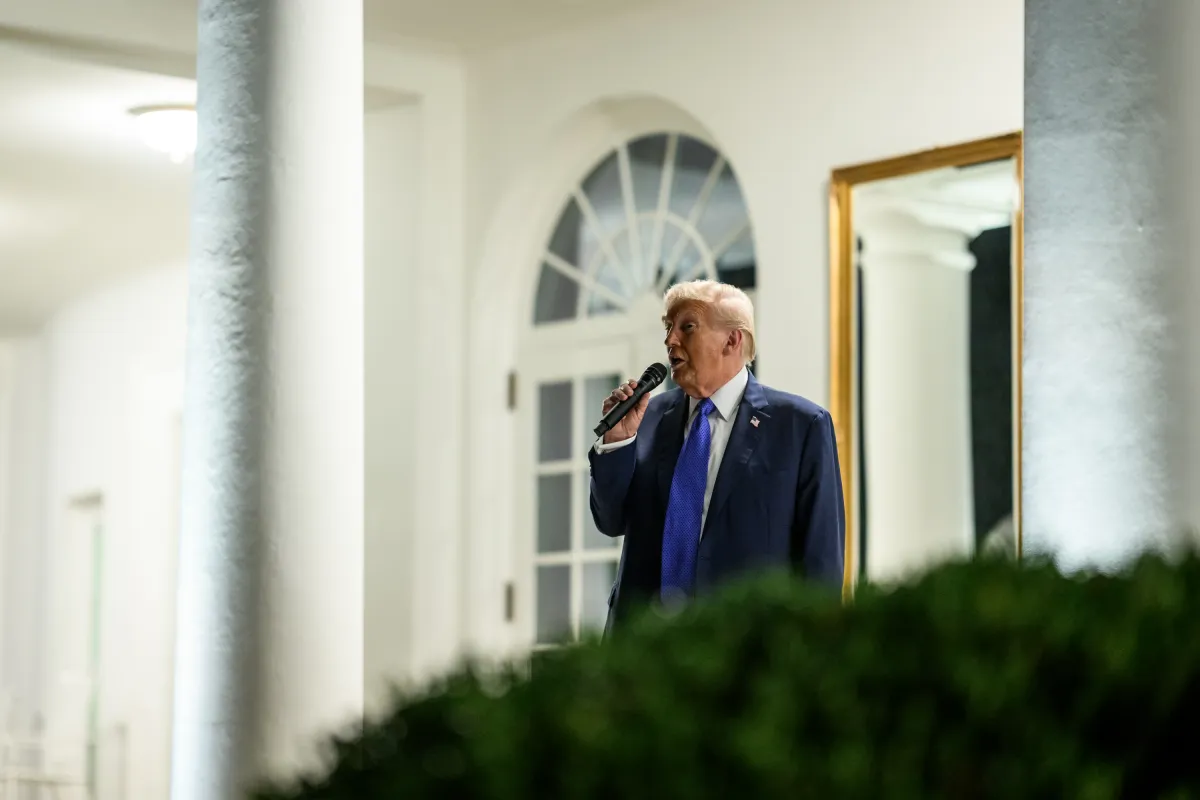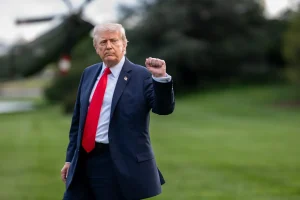President Donald Trump has spoken publicly for the first time since being passed over for the 2025 Nobel Peace Prize, claiming that this year’s laureate, Venezuelan opposition leader María Corina Machado, personally told him he “really deserved” the award.
The president, who has long expressed his desire to join the ranks of past U.S. Nobel Peace Prize winners, shared the remarks during an interview on Friday evening, a day after the Norwegian Nobel Committee awarded the prize to Machado for her “struggle to achieve a just and peaceful transition from dictatorship to democracy” in Venezuela.
Trump, 79, said he received a congratulatory call from Machado after the award’s announcement and claimed she credited him for his global peace initiatives.
“The person who actually got the Nobel Prize called today, called me, and said, ‘I’m accepting this in honor of you, because you really deserved it,’” Trump told reporters. “A really nice thing to do. I didn’t say, ‘Then give it to me,’ though.”
The president’s comments mark his first acknowledgment of the 2025 Nobel decision and add a surprising twist to the story of this year’s prize — one that continues to attract global attention.
Machado’s Historic Win
This year’s laureate, María Corina Machado, 58, is widely regarded as a key figure in Venezuela’s opposition movement. A longtime advocate for democratic reforms, Machado is credited with leading efforts to challenge the authoritarian rule of Nicolás Maduro.
Though she was widely believed to have won Venezuela’s 2024 presidential election, Maduro’s government refused to recognize the results, prompting international condemnation and an intensified crackdown on political opponents.
In announcing Machado’s selection, Nobel Committee Chair Jørgen Watne Frydnes praised her for “her struggle to achieve a just and peaceful transition from dictatorship to democracy.”
“She has been a key, unifying figure in a political opposition that was once deeply divided,” Frydnes said, “in a brutal authoritarian state that is now suffering a humanitarian and economic crisis.”
Machado responded with gratitude, saying the award represented “the suffering people of Venezuela” and expressing thanks to President Trump for what she described as “decisive support of our cause.”
“We are on the threshold of victory,” Machado said in her statement, “and today, more than ever, we count on President Trump, the people of the United States, the peoples of Latin America, and the democratic nations of the world as our principal allies to achieve freedom and democracy.”
Trump’s Reaction: ‘I Saved Millions of Lives’
In his remarks, President Trump appeared both gracious and reflective about the Nobel outcome, while again underscoring what he sees as his administration’s record on peace.
“I’m happy because I saved millions of lives,” he said, apparently referencing the ceasefire deal in Gaza that his administration helped broker earlier this year. “There are those who say that we did so much that they should have done it.”
Trump also seemed to suggest that timing played a role in the committee’s decision not to award him the prize.
“It was given after ’24 and I was running for office in ’24,” he said, implying that his active presidential campaign during the award’s review period may have affected the committee’s deliberations.
The White House later echoed that sentiment, issuing a statement claiming that “the Nobel Committee proved they place politics over peace.”
The statement argued that Trump’s diplomatic achievements — particularly the Gaza ceasefire, North Korea talks, and “de-escalation efforts across Eastern Europe” — represented “historic progress that cannot be ignored.”
A Longstanding Desire for the Prize
Trump’s fascination with the Nobel Peace Prize stretches back to his first term in office. He has frequently cited his role in negotiating international agreements as evidence that he deserves the honor.
In speeches, Trump has claimed credit for “ending seven wars” and has regularly referenced the Nobel Prize as a validation of his broader foreign policy philosophy — what he calls “peace through strength.”
Throughout his political career, he has made comparisons to former President Barack Obama, who was awarded the prize in 2009 just months after taking office. Trump has often argued that his own record exceeds Obama’s on matters of global security and diplomacy.
“Obama got it for doing nothing,” Trump once quipped during a 2020 campaign rally. “I did more in one week than he did in eight years.”
This year’s loss appears to have rekindled that sense of frustration, even as Trump publicly maintains that he bears no resentment toward the committee or Machado herself.
“She’s a very nice person,” Trump said of Machado. “A strong woman. I’m happy for her. But I think people know what we did. Everyone knows.”
Experts: Committee Was Unlikely to Choose Trump
Analysts and Nobel historians were quick to note that Trump’s chances of winning the prize this year were slim, citing both procedural and philosophical reasons.
Asle Sveen, a Nobel historian, explained that the 2025 prize considered accomplishments primarily from 2024, before Trump’s return to the Oval Office in January 2025.
“The period of review didn’t align with his administration’s current initiatives,” Sveen told ABC News. “And even if it had, the committee looks for individuals whose actions advance international fellowship, not those whose policies divide.”
Similarly, Nina Græger, director of the Peace Research Institute Oslo (PRIO), said Trump “simply did not fit the criteria.”
“The Peace Prize is meant to honor those who foster reconciliation and democracy through peaceful means,” she said. “The committee clearly wanted to highlight democracy this year, especially at a time when authoritarianism is spreading.”
Machado’s Nod to Trump Raises Eyebrows
Machado’s reported phone call to Trump has sparked debate in diplomatic circles, with some praising her gesture as a sign of goodwill and others viewing it as politically risky.
A senior European diplomat familiar with the matter said the call “appeared to be genuine admiration” but cautioned that it could complicate Venezuela’s international alliances.
“She likely wanted to thank Trump for his administration’s support of the Venezuelan opposition,” the diplomat said. “But any public alignment with Trump could make it easier for the Maduro regime to portray her as a Western puppet.”
Nonetheless, Machado’s words of appreciation have resonated with Trump’s supporters, who view them as validation of his global influence. Within hours of his statement, conservative commentators and lawmakers in Washington seized on the exchange as evidence that Trump’s peace efforts are “being recognized informally, even if not officially.”
Four American Presidents Have Won Before
Trump’s omission leaves the historical tally of U.S. presidents who have received the Nobel Peace Prize unchanged at four:
-
Theodore Roosevelt (1906), for mediating the end of the Russo-Japanese War.
-
Woodrow Wilson (1919), for founding the League of Nations.
-
Jimmy Carter (2002), for his decades of humanitarian work.
-
Barack Obama (2009), for his “extraordinary efforts to strengthen international diplomacy.”
Trump has frequently cited those examples in arguing that his own record surpasses theirs, pointing to his work on Middle East normalization and his push for new international trade and peace agreements.
A Tale of Two Legacies
For the Nobel Committee, this year’s decision underscores a growing preference for grassroots peacebuilders and democratic activists over sitting heads of state.
Over the past decade, laureates have included journalists, human rights advocates, and organizations rather than presidents or prime ministers.
As Nobel Chair Frydnes noted, “Democracy is a precondition for lasting peace.”
For Trump, however, the story remains unfinished. His claim that Machado accepted her prize “in honor of him” will likely fuel ongoing debates over his global reputation — and his quest for a place among the world’s Nobel laureates.
“We’ll see what happens next year,” Trump said with a smile. “There’s always next year.”

Emily Johnson is a critically acclaimed essayist and novelist known for her thought-provoking works centered on feminism, women’s rights, and modern relationships. Born and raised in Portland, Oregon, Emily grew up with a deep love of books, often spending her afternoons at her local library. She went on to study literature and gender studies at UCLA, where she became deeply involved in activism and began publishing essays in campus journals. Her debut essay collection, Voices Unbound, struck a chord with readers nationwide for its fearless exploration of gender dynamics, identity, and the challenges faced by women in contemporary society. Emily later transitioned into fiction, writing novels that balance compelling storytelling with social commentary. Her protagonists are often strong, multidimensional women navigating love, ambition, and the struggles of everyday life, making her a favorite among readers who crave authentic, relatable narratives. Critics praise her ability to merge personal intimacy with universal themes. Off the page, Emily is an advocate for women in publishing, leading workshops that encourage young female writers to embrace their voices. She lives in Seattle with her partner and two rescue cats, where she continues to write, teach, and inspire a new generation of storytellers.









